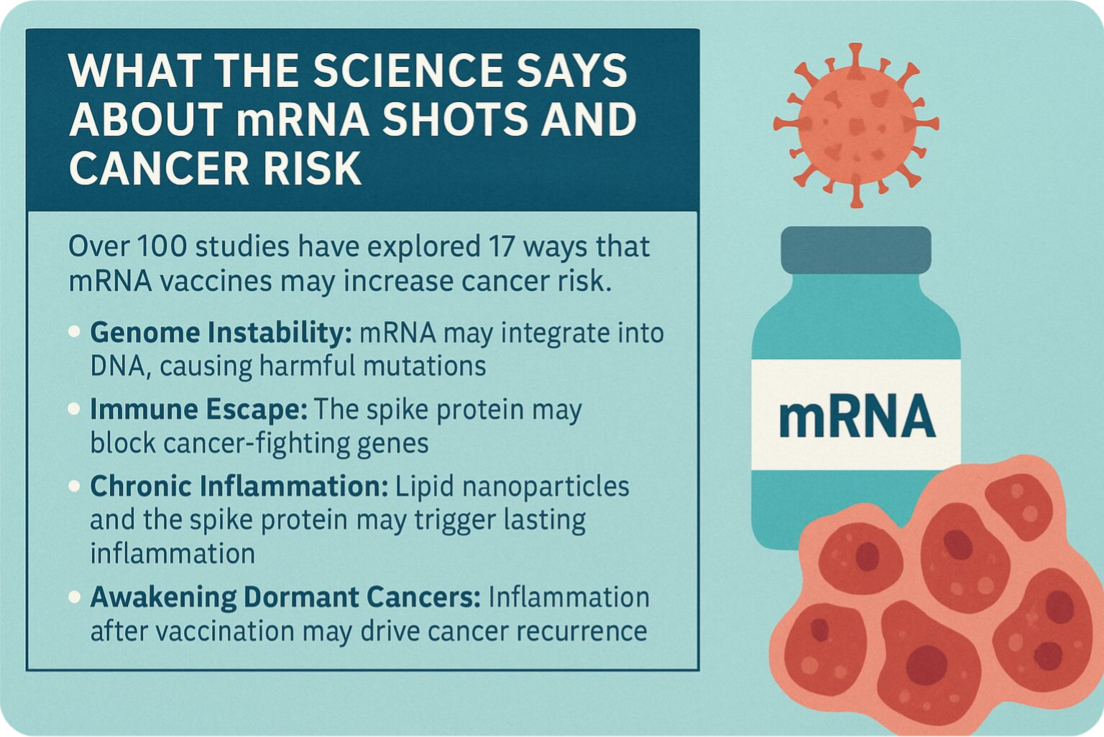17 Ways COVID mRNA Shots May Cause Cancer, According to Over 100 Studies (2025)

1. Genome Instability
mRNA may be reverse-transcribed and integrated into host DNA, triggering mutations that initiate cancer.
2. Immune Escape
The spike protein binds and inhibits tumor suppressor genes like p53 and BRCA1, shielding cancer cells from immune destruction.
3. Impaired DNA Repair Mechanism
The spike protein interferes with essential DNA repair enzymes, increasing the risk of unchecked mutations.
4. Chronic Inflammation
Lipid nanoparticles and spike protein cause long-lasting inflammation, a well-known driver of cancer.
5. Dysregulation of the Immune System
Suppression of T cells and type I interferon weakens cancer surveillance and promotes immune evasion.
6. RNA Disruption
Codon optimization disrupts microRNA networks, destabilizing cell growth regulation and apoptosis.
7. Activation of Oncogenic Pathways
The spike protein indirectly activates MAPK and PI3K/mTOR signaling, fueling tumor growth and metastasis.
8. Tumor Microenvironment Alteration
Lipid nanoparticles accumulate in tumors, enhancing permeability and potentially accelerating cancer spread.
9. Awakening Dormant Cancers
Post-vaccination inflammation and immune disruption may trigger recurrence in patients previously in remission.
10. Alteration of Immune Surveillance
Modified mRNA blocks toll-like receptors, making tumor cells "invisible" to the immune system.
11. Frameshift Errors
The synthetic mRNA sometimes produces unintended, aberrant proteins, contributing to oncogenic risk.
12. Multiple Injections
Repeated doses exhaust the immune system and drive class switching to IgG4, promoting tolerance to tumors.
13. DNA Contamination
Residual plasmid DNA found in vaccine vials is replication-competent and could integrate into host genomes.
14. Oncogenic SV40 DNA Sequences
SV40 promoter sequences in Pfizer vials may facilitate genome insertion—this same element is used to induce tumors in lab animals.
15. Deregulation of the Renin-Angiotensin System (RAS)
Spike-induced AT1R activation fosters oxidative stress and uncontrolled cell proliferation.
16. Destruction of the Microbiota
The injections deplete bifidobacteria, weakening immune balance and impairing anti-cancer responses.
17. Increased Resistance to Treatments
Spike exposure prolongs cancer cell survival during chemotherapy, possibly driving treatment resistance.
What Does the Science Say?
It’s important to note that these are biological mechanisms, not direct evidence that mRNA vaccines cause cancer. The data shows potential ways to initiate, accelerate, or reawaken malignant processes (Debord, 2025). Nicholas Hulscher, epidemiologist and McCullough Foundation administrator, highlighted the review in Dr. Peter McCullough’s Substack, urging deeper public and clinical attention to the data (Hulscher, 2025).

A growing number of published studies suggest:
- Lipid nanoparticles and spike protein may trigger long-lasting inflammation, a known cancer driver (Debord, 2025).
- Immune suppression — Spike protein exposure might hinder T-cell surveillance, weakening the body’s ability to detect and destroy cancer cells (Hulscher, 2025).
- Oncogenic signaling activation — Some mRNA components may stimulate tumor-promoting pathways like Akt/mTOR (Debord, 2025).
Can Anything Help?
Early research shows promise in repurposing antiparasitic drugs like ivermectin and mebendazole for cancer treatment, but the data is early-stage and based on preclinical models.A systematic review published in Acta Poloniae Pharmaceutica found that ivermectin appears safe, even in chemotherapy patients, and shows multiple anticancer mechanisms in lab settings (McCullough Foundation, 2025).
In vitro and animal studies suggest that ivermectin can induce apoptosis (programmed cell death), inhibit proliferation, and block angiogenesis in certain tumors (Zhang, Song, & Ci, 2017). Some researchers also point to synergistic effects when combined with mebendazole, another antiparasitic with a 100-year safety track record (Melotti, Ferrer, & Vélez, 2020).
What You Need to Know
- The mRNA–cancer link is theoretical, direct causality is not proven at the moment as investigations are on-going.
- Data reviews show there are real mechanisms worth studying.
- Medications like ivermectin and mebendazole are low-cost, widely used, and possibly under-utilized tools in the fight against cancer.
Got the Jab? Take Action to Safeguard Your Health
If you developed symptoms you didn’t have before your shot, we would encourage you to seek out expert help.At present, the Independent Medical Alliance (previously Front Line COVID-19 Critical Care Alliance - FLCCC) seems to have one of the best treatment protocols for post-jab injuries. It’s called I-RECOVER protocol.






.png)

Comments
Post a Comment